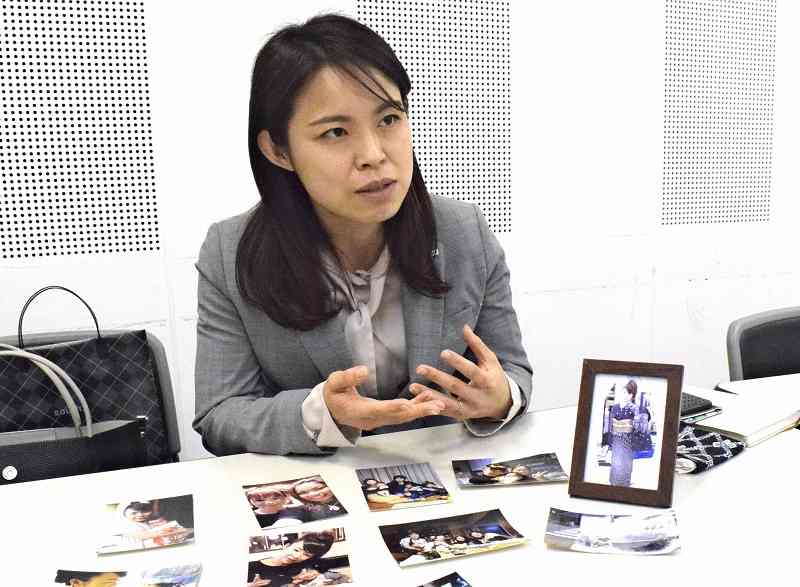
Mai Endo speaks in front of family photos, including those of her mother, Midori, on Oct. 25.
2:00 JST, November 26, 2022
A quarter of a century has passed since the Organ Transplants Law, which allows organs to be harvested from people declared brain-dead, came into effect in October 1997. However, the number of transplant cases has remained low, as only about 10% of people have expressed a desire to donate their organs.
Relatives of people who have donated organs hope more people will declare their willingness to help those in need of transplants, with one family member saying, “The desire to aid others is precious.”
A few years ago, Asami Murphy’s father, Fumiji, suffered a stroke at home. The 67-year-old did not regain consciousness after surgery and became unable to breathe on his own.

Asami Murphy speaks about her father, Fumiji, on Oct. 31.
While in his 50s and working as a city government employee, Fumiji had expressed a desire to donate his organs after death. Murphy, a nurse, was involved in transplant medicine at that time. When renewing his driver’s license, Fumiji asked his daughter, “What do you think about organ donations?”
Murphy explained that many patients in Japan were waiting for transplants, prompting Fumiji to give consent on his driver’s license for his organs to be used, though he also expressed some reticence about doing so.
Fumiji loved sports and played on a local baseball team even after turning 60. When he was declared brain-dead, his family was forced to make the final decision regarding whether to donate his organs; family members can refuse to give consent in such cases.
Feeling the warmth of her father’s body, Murphy was heartbroken. However, her mother, Noriko, 68, said, “He wished to donate, and it would be a waste if usable organs were cremated.” These words helped Murphy make up her mind.
The day after Fumiji was pronounced brain-dead, his family presented him a letter of gratitude that they had written together, and he was taken off to an operating room. His heart, lungs and kidneys were donated to five people.
Later, the family received a letter of thanks through the Japan Organ Transplant Network from a person who had received one of Fumiji’s organs.
“Because there was a written record of intent, it was possible to donate my father’s organs to people waiting for transplants,” Murphy, 38, said. “I’m sad [about the death of my father], but I also feel proud.”
Mai Endo, a company employee living in eastern Japan, has been giving speeches at local Lions Clubs and junior high schools since 2020, after the organs of her 61-year-old mother, Midori, were donated after she was declared brain-dead. As part of her activities, Endo always stresses the importance of expressing one’s intention to donate their organs.
Endo first heard of her mother’s willingness to donate when she was an elementary school student. “When I die, use all of my organs,” Endo recalled her mother saying.
Later, Endo herself donated bone marrow, and this experience led her and her mother to talk often about their shared desire to help ill people.
A few years ago, Endo’s mother had a stroke and lost consciousness while driving home from a restaurant she operated and became dependent on a ventilator to stay alive.
Although Endo struggled to accept her mother’s death, she decided to give consent for her mother’s organs to be used as she knew already about her mother’s desire to donate. Midori’s heart, kidneys and eyes were transplanted into five people.
“By sharing our experience, I hope it will encourage more people to express their intention to donate their organs — even if it’s only one person,” Endo said.
Endo continues to give her talks based on this philosophy.
Slow uptake
People can declare their intention to donate their organs on driver’s licenses, health insurance cards, My Number identification cards (also known as Individual Number Cards) and other documents. However, according to a survey of 3,000 people conducted by the Cabinet Office last year, though about 40% of respondents said they were willing to donate their organs, only about 10% had declared such willingness on relevant documents or expressed to relatives their desire to do so.
Given this situation, there are relatively few organ transplants in Japan. Nationally, the number of organ donors per million people stands at 0.62, compared to 41.88 in the United States and 40.2 in Spain.
In August this year, cases of organ trafficking were suspected in connection with living donor kidney transplants in developing countries mediated by the Intractable Disease Patient Support Association, a Tokyo-based nonprofit organization.
The serious shortage of donors in Japan contributes to some patients’ willingness to turn to such organizations.
Top Articles in Society
-

Man Infected with Measles May Have Come in Contact with Many People in Tokyo, Went to Store, Restaurant Around When Symptoms Emerged
-

Australian Woman Dies After Mishap on Ski Lift in Nagano Prefecture
-

Foreign Snowboarder in Serious Condition After Hanging in Midair from Chairlift in Nagano Prefecture
-

Record-Breaking Snow Cripples Public Transport in Hokkaido; 7,000 People Stay Overnight at New Chitose Airport
-

Train Services in Tokyo Resume Following Power Outage That Suspended Yamanote, Keihin-Tohoku Lines (Update 4)
JN ACCESS RANKING
-

Japan Institute to Use Domestic Commercial Optical Lattice Clock to Set Japan Standard Time
-

China Eyes Rare Earth Foothold in Malaysia to Maintain Dominance, Counter Japan, U.S.
-

Man Infected with Measles May Have Come in Contact with Many People in Tokyo, Went to Store, Restaurant Around When Symptoms Emerged
-

Japan, Qatar Ministers Agree on Need for Stable Energy Supplies; Motegi, Qatari Prime Minister Al-Thani Affirm Commitment to Cooperation
-

Australian Woman Dies After Mishap on Ski Lift in Nagano Prefecture
























